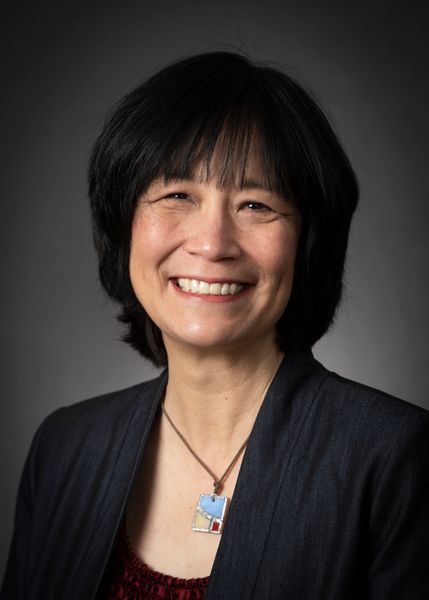Language Education Speaker Series
The Language Education Speaker Series at BU Wheelock College of Education & Human Development brings well-known scholars in the field of applied linguistics to campus to discuss their work. These talks are open to all members of the BU community, as well as scholars and students of applied linguistics throughout the Greater Boston area.
Upcoming Events
Racial, Linguistic and Community Belonging: The Juxtaposition of Brown v. Board of Education, Lau v. Nichols and Plyler v. Doe
Dr. Trish Morita-Mullaney
Thursday, October 23rd
5:00–6:30 pm (ET)
871 Commonwealth Avenue (College of General Studies)
Room 511
Boston, MA 02215
Register to attend here.
Abstract
The seminal Supreme Court language rights case, Lau v. Nichols (1974) found that the San Francisco Unified School District failed to provide adequate and appropriate instructional programming to 1,800 students of Chinese ancestry who did not speak English, which denied them a meaningful opportunity to participate in a public education. In the fields of bilingual education and language policy, Lau is regarded as the national case that changed the legal landscape for bilingual education as an allowable provision in schools for multiple ethnolinguistic groups.
Lau passed just as mandatory busing based on directives from the Brown case for racial integration was being implemented city-wide. Plyler would pass just eight years later, declaring that any child had the right to a free and public education regardless of immigration status. With most large districts absolved of requirements for racial integration and increasing policies to reduce educational provisions for bilingual and immigrant students, we are at an urgent inflection point of de-citzenry.
In this session, the stories of Cantonese-Chinese teachers, administrators, students, lawyers, and social activists’ illuminate how they intersected the aims of racial integration (busing) with language rights, setting stage for arguments made in Plyler, also shaping rationale for representation within voting rights. Using the framing of negative equity, which claims that every child deserves the same education is juxtaposed with positive equity, which asserts that the same education is never an equal education. Implications point to the need for historicizing Chinese language education and to build cross-racial and linguistic coalitions of curious solidarity to transform schools and communities for linguistic and racial equity.
About Dr. Morita-Mullaney
Trish Morita-Mullaney is a Professor in Language and Literacy Education at Purdue University and holds a courtesy appointment in Asian American Studies program. Her research focuses on the intersections between language, gender and race and how this informs the identity acts of educators of multilingual communities. Guided by critical and feminist thought, she examines how these overlapping identities inform the logics of educational decision making for multilingual families. Her newer line of research focuses on how AAPI communities are pathologized as persistently foreign, thereby rationalizing a subtlety of subjugation and erasure. She has studied the Lau case and how it was developed, experienced, and implemented by the Chinese American community of San Francisco, representing the original history and voice of Lau. Her book, Lau v. Nichols and Chinese American Language Rights: The Sunrise and Sunset of Bilingual Education with Multilingual Matters was published in 2024 chronicling the story of Lau’s development and implementation within the Chinese community of San Francisco’s Chinatown. Her next book Asian Americans in Bilingualism and Bilingual Education: The Long Overdue Voice will be published in December 2025.

Previous Events in the Series
February 25th, 2025
Already Home: Unearthing Black World Language Teachers’ Cultural, Linguistic and Professional Prowess
Dr. Tasha Austin, SUNY Buffalo
February 8th, 2024
False Positives, Re-Entry Programs and Long-Term English Learners”: Undoing Dichotomous Frames in U.S. Language Education Policy
Dr. Nelson Flores, University of Pennsylvania
January 29, 2024
Unveiling Bias in Second Language Acquisition Research: A Critical Examination of Convenience Sampling and Implications for Generalizability
Dr. Aline Godfroid, Michigan State University
October 24, 2023
Understanding Wampanoag Culture Through Wôpanâak Language
Dr. Nitana Hicks Greendeer, Brown University
October 5, 2023
¿Soy Acaso Negra?: A Testimonio on the Erasure of Black Latines within, and beyond, Bilingual Education.
Dr. María Cioè-Peña. University of Pennsylvania
April 11, 2023
Researching Language Learning and Multilingualism: From Social Justice to a Decolonial Lens?
Lourdes Ortega, Georgetown University
April 3, 2023
Navigating language learning as a non-binary student: Insights into diverse experiences from participatory research with non-binary youth
Julia Donnelly Spiegelman, UMASS Boston
November 2, 2022
What Effect Do Heritage Languages Have on Majority English in Adolescent and Adult Heritage Speaker Bilinguals?
Shanley Allen, University of Kaiserslautern
September 26, 2022
Biliteracy as Property: The Promise and Perils of Seal of Biliteracy and Dual Language Programming through an Equity Lens
Chris Chang-Bacon, University of Virginia
March 28, 2022
Language Learning Apps: Do They Really Work?
Shawn Loewen, Michigan State University
February 22, 2022
Enacting a Critical Translingual Approach in Teacher Development
Kate Seltzer, Rowan University
November 16, 2021
Measuring L2 Grit Not Once, But Twice, and Exploring How Much Learners Need it to Succeed
Paula Winke, Michigan State University
October 26, 2021
Complex Dynamic Systems Theory—Learning-Centered Teaching
Diane Larsen-Freeman, University of Michigan
February 8, 2021
Shifting the Discourse from Deficit to Difference: Understanding the Cognitive Neuroscience of Learning in Bilingual Learners
Gigi Luk, McGill University